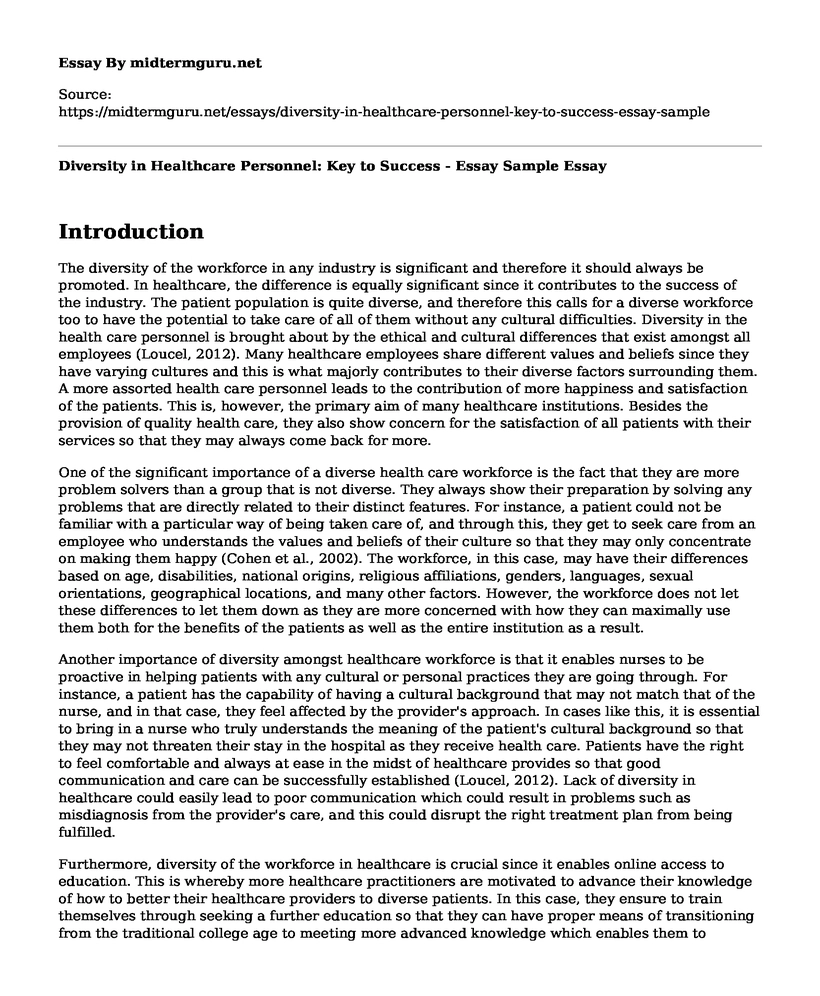Introduction
The diversity of the workforce in any industry is significant and therefore it should always be promoted. In healthcare, the difference is equally significant since it contributes to the success of the industry. The patient population is quite diverse, and therefore this calls for a diverse workforce too to have the potential to take care of all of them without any cultural difficulties. Diversity in the health care personnel is brought about by the ethical and cultural differences that exist amongst all employees (Loucel, 2012). Many healthcare employees share different values and beliefs since they have varying cultures and this is what majorly contributes to their diverse factors surrounding them. A more assorted health care personnel leads to the contribution of more happiness and satisfaction of the patients. This is, however, the primary aim of many healthcare institutions. Besides the provision of quality health care, they also show concern for the satisfaction of all patients with their services so that they may always come back for more.
One of the significant importance of a diverse health care workforce is the fact that they are more problem solvers than a group that is not diverse. They always show their preparation by solving any problems that are directly related to their distinct features. For instance, a patient could not be familiar with a particular way of being taken care of, and through this, they get to seek care from an employee who understands the values and beliefs of their culture so that they may only concentrate on making them happy (Cohen et al., 2002). The workforce, in this case, may have their differences based on age, disabilities, national origins, religious affiliations, genders, languages, sexual orientations, geographical locations, and many other factors. However, the workforce does not let these differences to let them down as they are more concerned with how they can maximally use them both for the benefits of the patients as well as the entire institution as a result.
Another importance of diversity amongst healthcare workforce is that it enables nurses to be proactive in helping patients with any cultural or personal practices they are going through. For instance, a patient has the capability of having a cultural background that may not match that of the nurse, and in that case, they feel affected by the provider's approach. In cases like this, it is essential to bring in a nurse who truly understands the meaning of the patient's cultural background so that they may not threaten their stay in the hospital as they receive health care. Patients have the right to feel comfortable and always at ease in the midst of healthcare provides so that good communication and care can be successfully established (Loucel, 2012). Lack of diversity in healthcare could easily lead to poor communication which could result in problems such as misdiagnosis from the provider's care, and this could disrupt the right treatment plan from being fulfilled.
Furthermore, diversity of the workforce in healthcare is crucial since it enables online access to education. This is whereby more healthcare practitioners are motivated to advance their knowledge of how to better their healthcare providers to diverse patients. In this case, they ensure to train themselves through seeking a further education so that they can have proper means of transitioning from the traditional college age to meeting more advanced knowledge which enables them to succeed in their healthcare providers. Also, the need to seek online education allows them to bring diversity into the healthcare profession and ensure that they fully know how to handle it for the best of healthcare provision they can have (Loucel, 2012). Patients are also happy and more satisfied to learn that they are in the midst of a diverse workforce and therefore their problems are likely to be solved better.
Conclusion
In conclusion, diversity is an essential aspect in each institution, and therefore healthcare should also embrace it. It is essential therefore to embrace diversity and work through its benefits as one shuns its disadvantages. Focusing on its importance improves healthcare provision and enables more patients to be satisfied with all the care they receive since it is a sign of respect and acceptance of their diverse cultural backgrounds. Hence, diversity in the healthcare workforce is indeed beneficial both to the providers and the patients in general.
References
Cohen, J. J., Gabriel., B. A., & Terrell, C. (2002). "The Case For Diversity In The Health Care Workforce." The People to People Health Foundation, Inc.
Loucel, C. (2012). "In Health Care, Diversity Matters." Science of Caring: University of California San Francisco.
Cite this page
Diversity in Healthcare Personnel: Key to Success - Essay Sample. (2023, Jan 11). Retrieved from https://midtermguru.com/essays/diversity-in-healthcare-personnel-key-to-success-essay-sample
If you are the original author of this essay and no longer wish to have it published on the midtermguru.com website, please click below to request its removal:
- Essay on Familial Diseases Risks
- Paper Example on Plant-Based Diet to Reverse/Prevent Cardiovascular Disease
- Essay Sample on Bio Ethics: Moral Permissibility of Abortion
- Essay Sample on Diabetes Mellitus
- Essay Sample on Racial Tensions in America
- Cancer: Diagnosis, Treatment, and Debate - Research Paper
- Detecting Distress in Gynecologic Cancer Patients: An Analysis - Essay Sample







